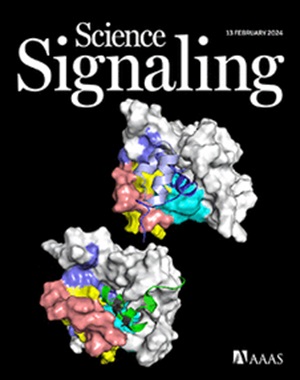与 ALS/FTD 基因 C9ORF72 相关的多聚-GR 重复序列会损害神经元的翻译延伸并诱发核糖毒性应激反应。
IF 6.7
1区 生物学
Q1 BIOCHEMISTRY & MOLECULAR BIOLOGY
引用次数: 0
摘要
C9ORF72 基因的六核苷酸重复扩增是肌萎缩侧索硬化症(ALS)和额颞叶痴呆症(FTD)最常见的遗传病因。这种扩增会产生多种二肽重复蛋白,其中富含精氨酸的多 GR 蛋白对神经元具有很强的毒性,会降低蛋白质的合成速度。我们研究了对蛋白质合成的影响是否会导致神经元功能障碍和退化。我们发现,poly-GR 蛋白的表达通过扰乱翻译延伸抑制了全局翻译。在 iPSC 分化的神经元中,延伸率相对较慢的转录本的翻译在 poly-GR 的作用下进一步减慢和停滞。延伸停滞增加了核糖体碰撞,诱导了由 ZAKα 介导的核糖毒性应激反应(RSR),该反应增加了激酶 p38 的磷酸化,促进了细胞死亡。敲除 ZAKα 或药物抑制 p38 可改善聚-GR 诱导的毒性,并提高 C9ORF72-ALS/FTD 患者 iPSC 衍生神经元的存活率。我们的研究结果表明,靶向 RSR 可能对 C9ORF72 重复扩增引起的 ALS/FTD 患者具有神经保护作用。本文章由计算机程序翻译,如有差异,请以英文原文为准。
Poly-GR repeats associated with ALS/FTD gene C9ORF72 impair translation elongation and induce a ribotoxic stress response in neurons
Hexanucleotide repeat expansion in the C9ORF72 gene is the most frequent inherited cause of amyotrophic lateral sclerosis (ALS) and frontotemporal dementia (FTD). The expansion results in multiple dipeptide repeat proteins, among which arginine-rich poly-GR proteins are highly toxic to neurons and decrease the rate of protein synthesis. We investigated whether the effect on protein synthesis contributes to neuronal dysfunction and degeneration. We found that the expression of poly-GR proteins inhibited global translation by perturbing translation elongation. In iPSC-differentiated neurons, the translation of transcripts with relatively slow elongation rates was further slowed, and stalled, by poly-GR. Elongation stalling increased ribosome collisions and induced a ribotoxic stress response (RSR) mediated by ZAKα that increased the phosphorylation of the kinase p38 and promoted cell death. Knockdown of ZAKα or pharmacological inhibition of p38 ameliorated poly-GR–induced toxicity and improved the survival of iPSC–derived neurons from patients with C9ORF72-ALS/FTD. Our findings suggest that targeting the RSR may be neuroprotective in patients with ALS/FTD caused by repeat expansion in C9ORF72.
求助全文
通过发布文献求助,成功后即可免费获取论文全文。
去求助
来源期刊

Science Signaling
BIOCHEMISTRY & MOLECULAR BIOLOGY-CELL BIOLOGY
CiteScore
9.50
自引率
0.00%
发文量
148
审稿时长
3-8 weeks
期刊介绍:
"Science Signaling" is a reputable, peer-reviewed journal dedicated to the exploration of cell communication mechanisms, offering a comprehensive view of the intricate processes that govern cellular regulation. This journal, published weekly online by the American Association for the Advancement of Science (AAAS), is a go-to resource for the latest research in cell signaling and its various facets.
The journal's scope encompasses a broad range of topics, including the study of signaling networks, synthetic biology, systems biology, and the application of these findings in drug discovery. It also delves into the computational and modeling aspects of regulatory pathways, providing insights into how cells communicate and respond to their environment.
In addition to publishing full-length articles that report on groundbreaking research, "Science Signaling" also features reviews that synthesize current knowledge in the field, focus articles that highlight specific areas of interest, and editor-written highlights that draw attention to particularly significant studies. This mix of content ensures that the journal serves as a valuable resource for both researchers and professionals looking to stay abreast of the latest advancements in cell communication science.
 求助内容:
求助内容: 应助结果提醒方式:
应助结果提醒方式:


